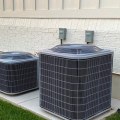HEPA, or high-efficiency particulate air, is the gold standard for air filtration. These filters are often used in medical settings, as they can capture at least 99.97% of particles as small as 0.3 microns. This includes microscopic substances such as mold, dust, and pet dander. While a HEPA filter offers many advantages, it also has certain drawbacks.
HEPA filters are thick and dense, which can interfere with the airflow process of your HVAC equipment. If airflow is restricted, demand for heating and cooling on the property will increase, resulting in higher utility bills and potential damage to the entire HVAC system. For this reason, a HEPA filtration system is not suitable for all residential structures. It's rare and generally not recommended to use a HEPA air filter in a traditional home HVAC system. The good news is that if you want a highly effective filter for your home, the EPA (United States Environmental Protection Agency) reports that AC filters with a MERV rating of 7 to 13 have a “chance of being almost as effective as true HEPA filters”.
This means that when placed in a filtration system, these filters can remove 99.97 percent of particulate matter from the air. Even if you buy HEPA filters, if you don't change them regularly, your HVAC system will wear out much faster. Remember that the air in your home is recirculated, so the same air will pass through the filter several times a day. If you're concerned about the indoor air quality of your residence, HEPA filters are a powerful method to improve the air your loved ones breathe. How often the filter needs to be cleaned or replaced will depend on the season or region, but Loiko recommends a minimum of every 3 months. There are several considerations when thinking about which one would work best with your HVAC or air purifier.
Before you buy your next HVAC filter, make sure you understand how it affects indoor air quality and energy efficiency. Electrostatically charged pleated synthetic filter can trap 90 percent of particles in the air without affecting airflow, according to manufacturer. If you're trying to install a HEPA filter in your oven, you're probably having trouble getting enough air from the vents. This electrostatic air filter has a MERV rating of 12, making it sufficient for common allergens, such as mold spores, pollen, and pet dander. Dirty or clogged filters will not be able to function properly and are likely to be the main source of equipment malfunctions. These filtration systems sometimes have a multi-step filtration process, with a pre-filter for large particles, a MERV 17 filter for excess contaminants, and a carbon filter for odors.
To improve filtration power, some models of these systems have UV germicidal lights and activated carbon filters. In conclusion, HEPA filters are an excellent way to improve indoor air quality and protect your family from harmful particles in the air. However, they may not be suitable for all residential structures due to their thickness and density interfering with airflow processes. If you're looking for an effective alternative to HEPA filters for your home HVAC system, consider AC filters with a MERV rating of 7 to 13.


